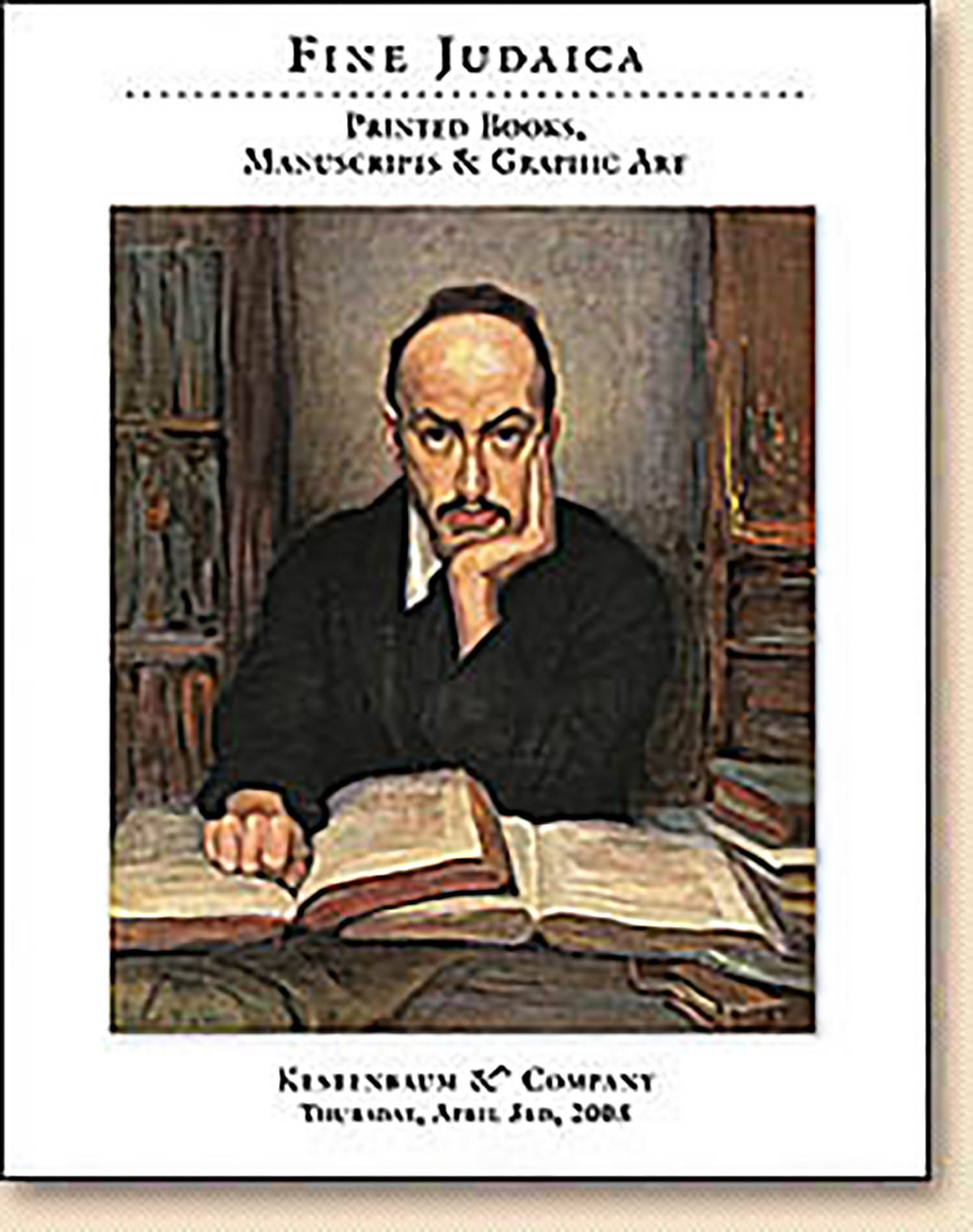FANNY LEVANDA (LEWANDO). Vegetarish-Dietisher Kochbuch

AUCTION 39 |
Thursday, April 03rd,
2008 at 1:00
Fine Judaica: Printed Books, Manuscripts, Autograph Letters & Graphic Art
Lot 90
(COOK-BOOK).
FANNY LEVANDA (LEWANDO). Vegetarish-Dietisher Kochbuch
Vilna: 1938
Est: $100 - $150
PRICE REALIZED $2,750
A Yiddish language vegetarian-dietetic cookbook with an article on the medical benefits of such cuisine. The author was the owner of a vegetarian restaurant in Vilna and she includes in her book testimonials from her customers, including Marc Chagall and Itzik Manger.
INFO FOUND YEARS LATER…
Lewando, Fania (Levanda) פֿאַניאַ לעוואַנדאָס וועגעטאַריש-דיעטעטישער קאָכבוך, ווילנע 1938 1938,.
וועגעטאַריש-דיעטעטישער קאָכבוך.
Vegetarish-diyetisher kokhbukh; 400 shpeizn gemakht oysshlishlekh fun Grinsen, 233pp color illustrations, YIVO librarian, Aviva Astrinsky, suggests that the color illustrations were derived from illustrations of vegetables on seed packets which were sold in Europe and Palestine, portrait of author, the author was owner of vegetarian restaurant in Vilna, Dieto-Jarska Jadlodajnia, Niemiecka 14, (Deutsche Gasse, Vokiečių gatvė in present day Vilnius) and includes testimonials from her customers Marc Chagall, Itzik Manger.Alter Kaczyzne, Yudel Mark, Daniel Charney, Noah Priluttski,and Der Tunkeler as well as actors, painters and doctors from New York, Bucharest and Warsaw. Includes article of medical benefits of vegetarian diet without politics or tracts; Introduction by B.Demsky (3.50 Gulden, $1.50).The author lectured on the S.S. Bathory between Gdynia and New York and installed a vegetarian kitchen on the ship. Fejge (Fania) nee Fiszliewicz ( Fishelevich,or Fisher) was the daughter of Chaim Efraim and Ester Malka,and was born in Wloclawek (Waslawik, Wloslawek?)and lived in Dacha Street in Vilna, the restaurant at Niemiecka 14 (Vokiečių gatvė). Her husband Lazar (Eliezar) was born in Byelorussia. They both perished while escaping to the Soviet Union. According to Rabbi Benjamin Skolnick, their nephew, they were about 65 years old. Pre-War population was nearly 100,000 comprising 45% of the city's total."Vilna Vegetarianism, 1938" Lilith 2010 Volume 35, number 3 by Frances Brent and foodwriter Judith Hausman. According to well published cookbook author, Josephine Bacon, there was an article in"The Jewish Vegetarian" about this book, the owner said it was probably the only copy extant. Pessl Beckler-Stern and her husband Hank Stern donated their copy to YIVO. They originally purchased it in Hay-on-Wye, Wales in 1995. Mordkhe Schaechter said, to his knowledge, this is only one of 2 copies in existence.OCLC states that Harvard Univ. Library has a copy., others in HUC, YIVO, no copies remain in Vilna (provenance Kestenbaum & Company Auction, April 3, 2008, Yiddish Cook Book with colored illustrations, Vilna, 1938, that ultimately sold for $3,245 after extremely competitive bidding against a presale estimate of $100-$150 [Lot 90]. http://www.yivoinstitute.org/uploads/files/yivo_yedies205.pdf Handwritten recipe for honey cake inside back cover.
In 1938, Fania Lewando, the proprietor of a popular vegetarian restaurant in Vilna, published a Yiddish vegetarian cookbook unlike any that had come before. Its 400 recipes ranged from traditional Jewish dishes (kugel, blintzes, fruit compote, borscht) to vegetarian versions of Jewish holiday staples (tsholent, kishke, schnitzel) to appetizers, soups, main courses, and desserts that introduced vegetables and fruits that had not traditionally been part of the repertoire of the Jewish homemaker (Chickpea Cutlets, Jerusalem Artichoke Soup; Leek Frittata; Apple Charlotte with Whole Wheat Breadcrumbs). Also included were impassioned essays by Lewando and by a physician about the benefits of vegetarianism. Accompanying the recipes were lush full-color drawings of vegetables and fruit that had originally appeared on bilingual (Yiddish and English) seed packets. Lewando's cookbook was sold throughout Europe.
Lewando and her husband died during World War II, and it was assumed that all but a few family-owned and archival copies of her cookbook vanished along with most of European Jewry.
